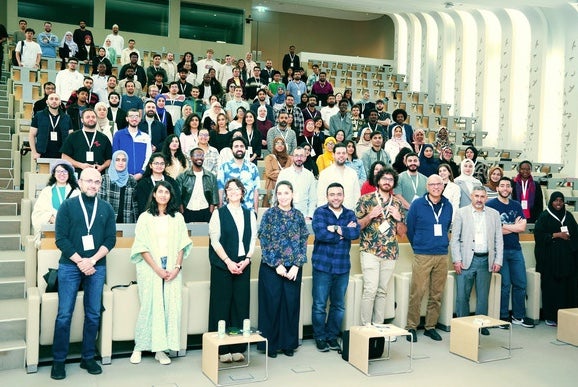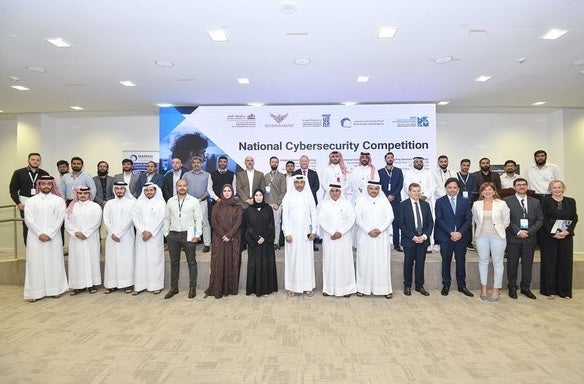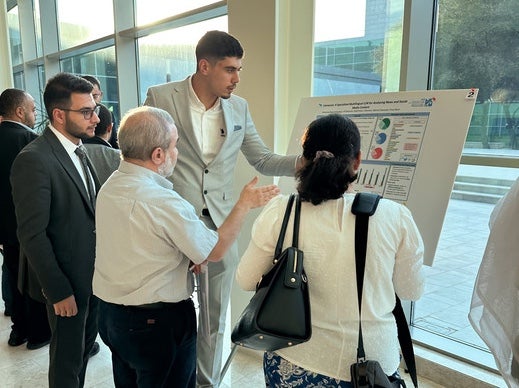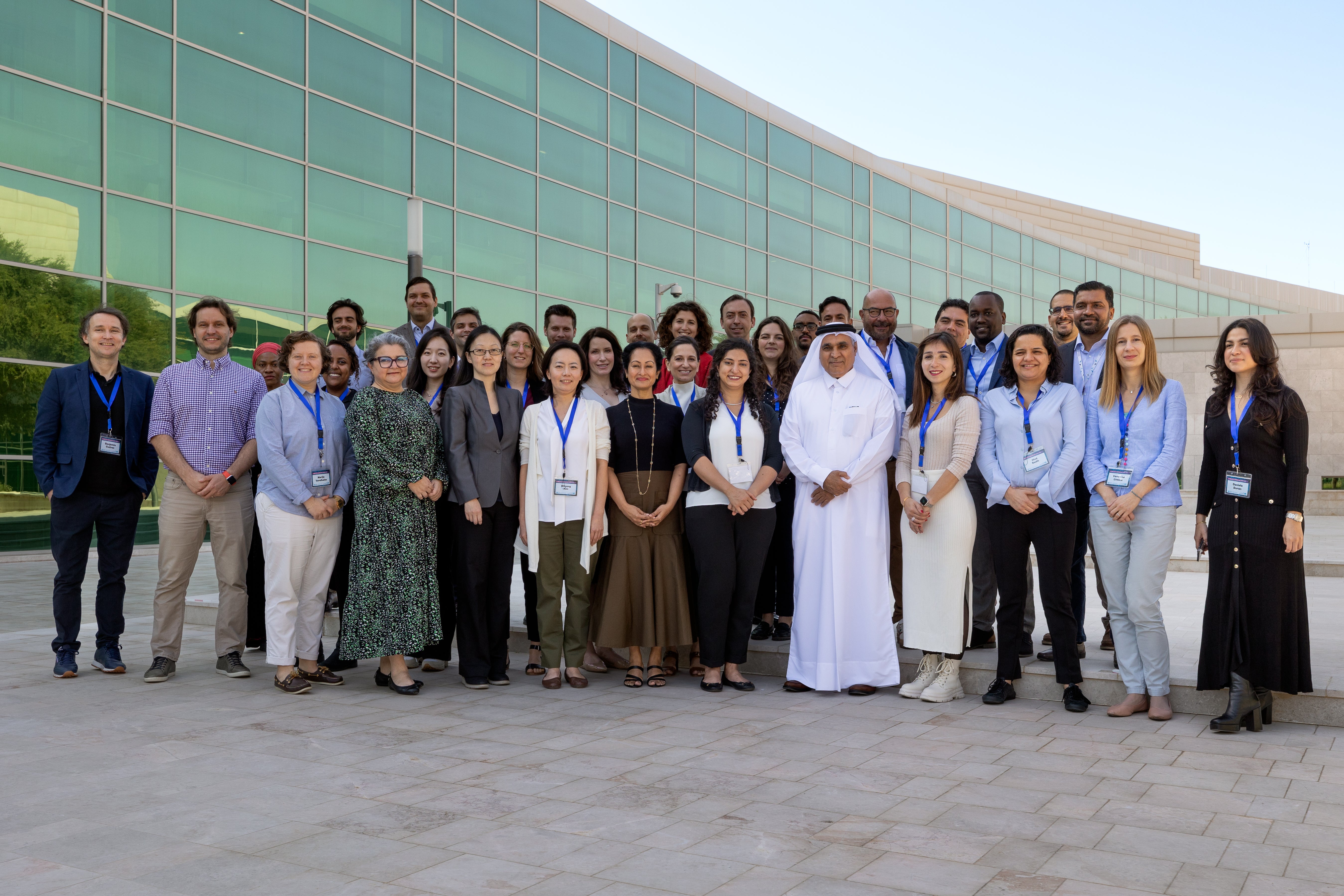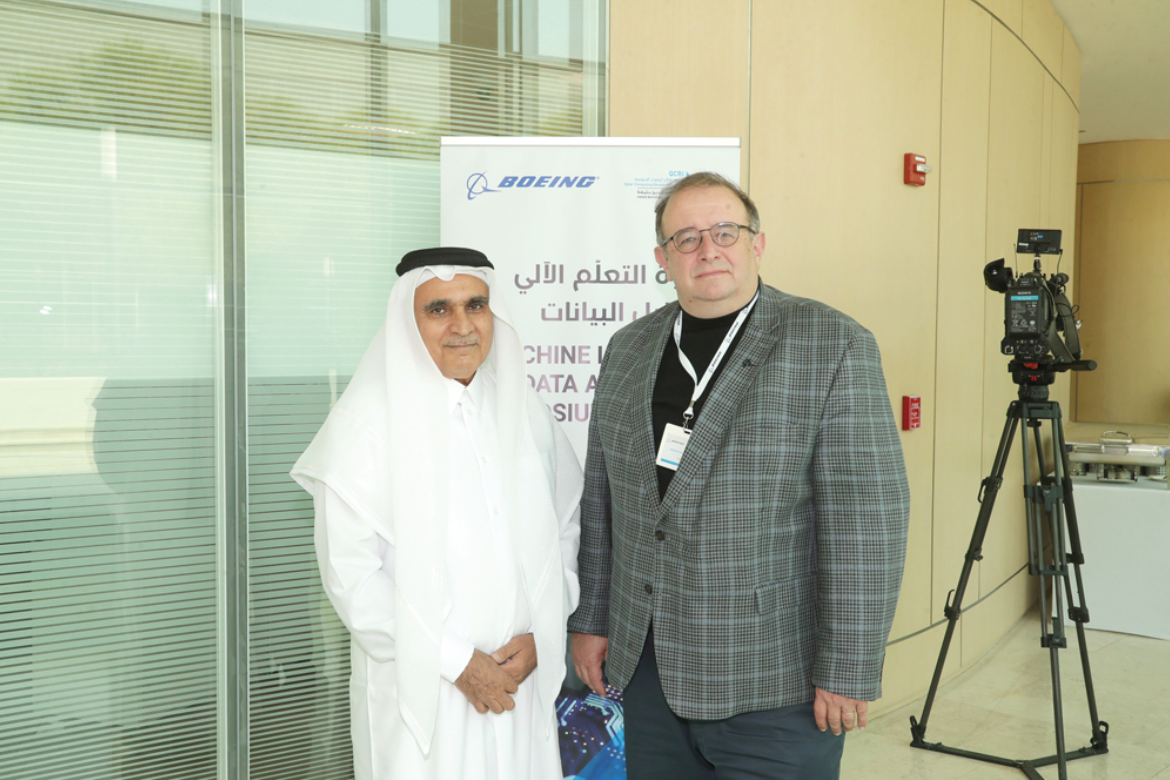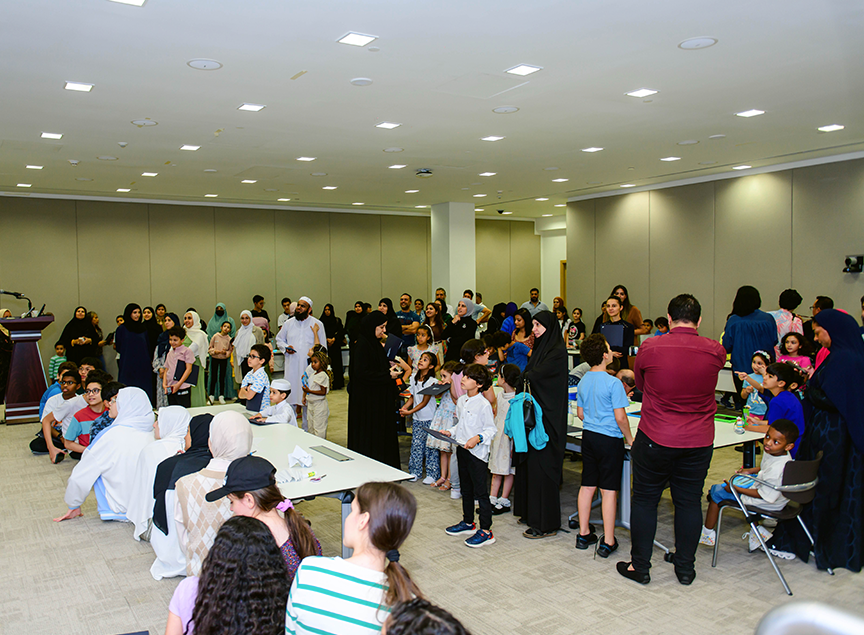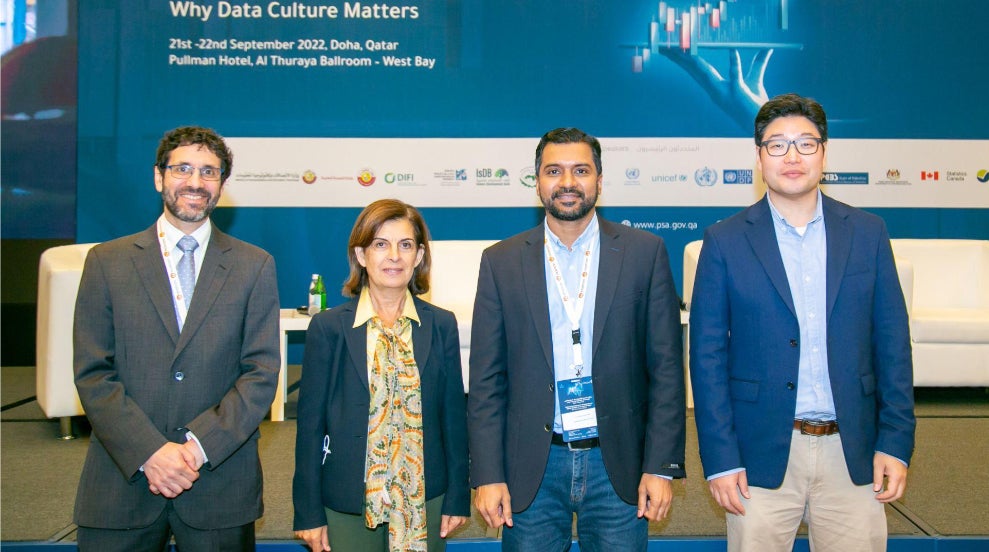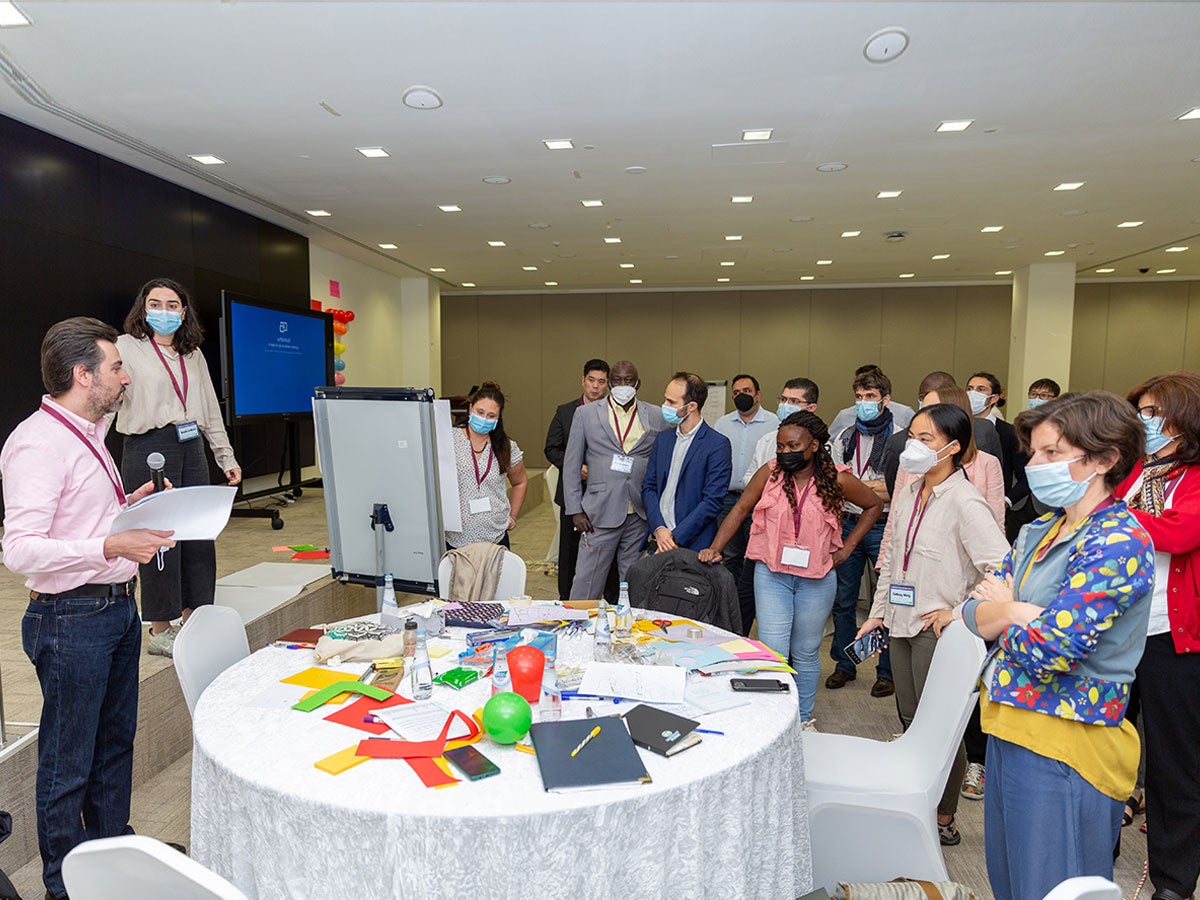
Qatar Computing Research Institute Webinars Examine Data Exploration and Meta-Data for COVID-19

The Qatar Computing Research Institute (QCRI), part of Hamad Bin Khalifa University (HBKU), commenced its COVID-19 webinar series with two online lectures addressing the topics of Data Exploration and Visualization of COVID-19 Data and the Meta-Research of COVID-19 Literature. The lectures form part of an ongoing and immersive series of webinars that are freely available to the public.
Data Exploration and Visualization of COVID-19 Data introduced tools and techniques through which data can be better understood and modeled. The lecture touched upon the notions of “good” versus “bad” data visualization, techniques that enable good visualization, and associated challenges. Offered in two parts, Data Exploration and Visualization of COVID-19 Data delved into a study of several aspects of COVID-19 by reviewing various visualization methods. Data preparation techniques and their challenges (including inconsistent formats, data errors, missing values, uncertainties in exponential growth) were reviewed. The second half of the lecture offered an exploratory data analysis (EDA) and a comparative view of the advantages and disadvantages of each visualization model. For example, it is crucial to visualize data in a proper scale in order to understand the growth of the pandemic.
Speaking after the webinar, Dr. Sanjay Chawla, Research Director of the Qatar Center for Artificial Intelligence, QCRI, said: “This webinar focused on the benefits and pitfalls of data visualization design and addressed each facet of data modeling for COVID-19 data. Data and data analytics have assumed a central role in the first wave of the global response to COVID-19, and will continue to be key tools as the pandemic unfolds.”
The institute’s second webinar on Meta-Research of COVID-19 Literature showcased QCRI’s in-house technologies, which were specifically built to enable rapid literature screening. Rayyan, QCRI’s systematic review application, provides a review of the COVID-19 Open Research Dataset. Users also enjoy a nearly 50 percent reduction in time utilized to scan relevant publications.
Dr. Mourad Ouzzani, Principal Scientist at QCRI, said: “Researchers around the world are investing a substantial amount of time in reviewing thousands of COVID-19 publications – a process that can be daunting and laborious. A high-quality systematic review can be one of the most critical pieces of evidence to guide clinical practices. Rayyan aims to deliver a detailed summary of readily-available primary research in response to important COVID-19 questions.”
QCRI’s upcoming webinars - to be held on May 4 and 7 – are Managing Health Services During a Pandemic and COVID-19 Epidemiological Modeling. All webinars are freely accessible at https://www.hbku.edu.qa/en/data-science-covid-19.
QCRI is one of three national research institutes operating under HBKU’s umbrella. Its four divisions pioneer online solutions for cybersecurity, data analytics, social computing, and Arabic language technologies. QCRI is also home to the recently launched Qatar Center for Artificial Intelligence. A highly skilled software engineering team supports all divisions and projects.
For more information on the work of Qatar Computing Research Institute, please visit qcri.hbku.edu.qa.
Related News

HBKU’s Qatar Computing Research Institute Concludes Summer Internship Program Online

Qatar Computing Research Institute Continues Webinar Series with Focus on COVID-19 Challenges
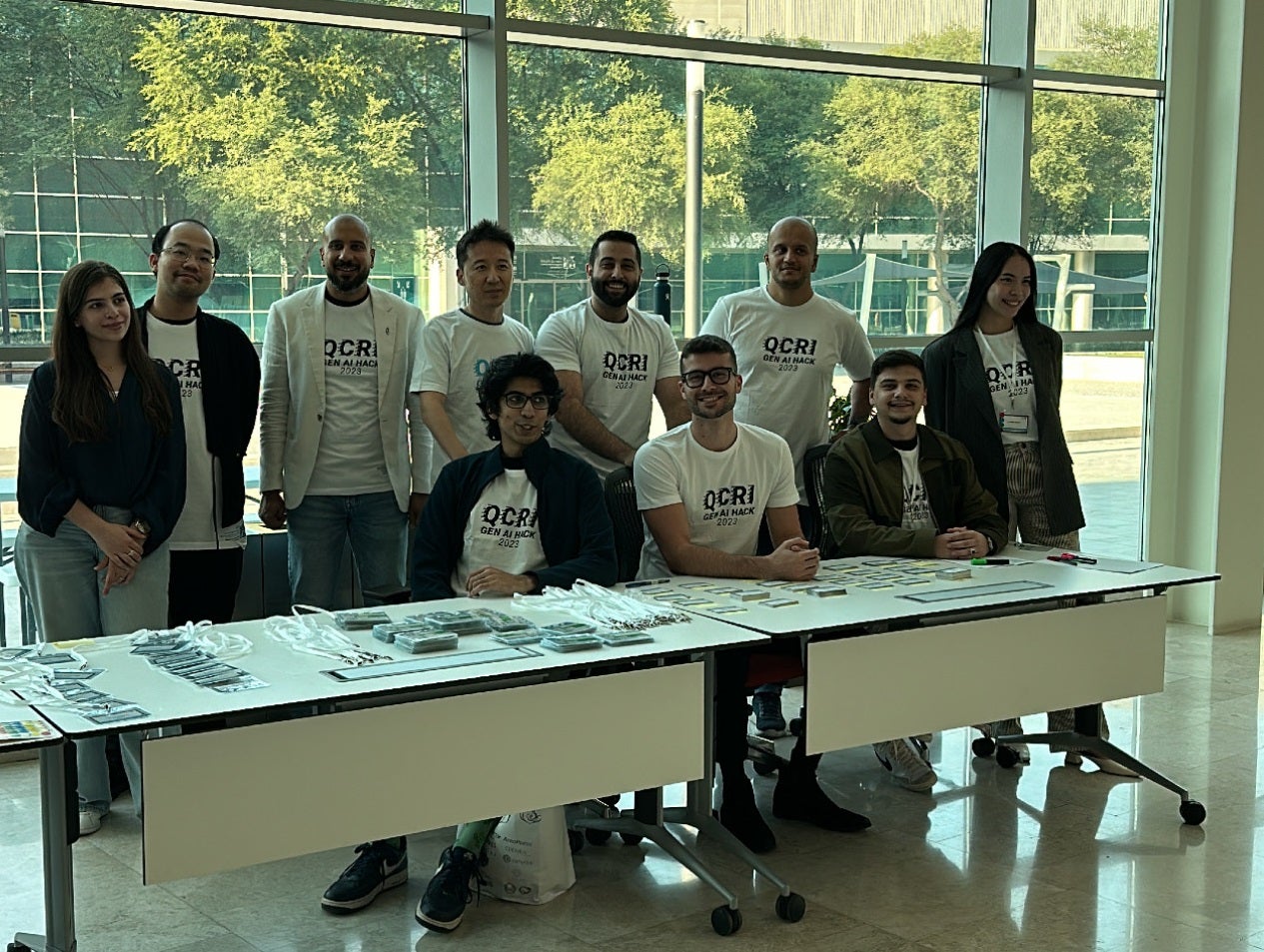
QCRI Generative AI Hackathon Delivers a Showcase of Innovation and Collaboration

HBKU’s QCRI Receives King Salman International Academy Award for the Arabic Language 2023

QCRI, HMC and the Mayo Clinic Shed Light on Genomics of Coronary Heart Disease

HBKU’s Qatar Computing Research Institute Concludes Summer Internship Program Online

Qatar Computing Research Institute Continues Webinar Series with Focus on COVID-19 Challenges

QCRI Generative AI Hackathon Delivers a Showcase of Innovation and Collaboration

HBKU’s QCRI Receives King Salman International Academy Award for the Arabic Language 2023

QCRI, HMC and the Mayo Clinic Shed Light on Genomics of Coronary Heart Disease

HBKU’s Qatar Computing Research Institute Concludes Summer Internship Program Online

Qatar Computing Research Institute Continues Webinar Series with Focus on COVID-19 Challenges

QCRI Generative AI Hackathon Delivers a Showcase of Innovation and Collaboration

HBKU’s QCRI Receives King Salman International Academy Award for the Arabic Language 2023

QCRI, HMC and the Mayo Clinic Shed Light on Genomics of Coronary Heart Disease

HBKU’s Qatar Computing Research Institute Concludes Summer Internship Program Online

Qatar Computing Research Institute Continues Webinar Series with Focus on COVID-19 Challenges

QCRI Generative AI Hackathon Delivers a Showcase of Innovation and Collaboration

HBKU’s QCRI Receives King Salman International Academy Award for the Arabic Language 2023

QCRI, HMC and the Mayo Clinic Shed Light on Genomics of Coronary Heart Disease

HBKU’s Qatar Computing Research Institute Concludes Summer Internship Program Online

Qatar Computing Research Institute Continues Webinar Series with Focus on COVID-19 Challenges

QCRI Generative AI Hackathon Delivers a Showcase of Innovation and Collaboration

HBKU’s QCRI Receives King Salman International Academy Award for the Arabic Language 2023

QCRI, HMC and the Mayo Clinic Shed Light on Genomics of Coronary Heart Disease

HBKU’s Qatar Computing Research Institute Concludes Summer Internship Program Online

Qatar Computing Research Institute Continues Webinar Series with Focus on COVID-19 Challenges

QCRI Generative AI Hackathon Delivers a Showcase of Innovation and Collaboration

HBKU’s QCRI Receives King Salman International Academy Award for the Arabic Language 2023

QCRI, HMC and the Mayo Clinic Shed Light on Genomics of Coronary Heart Disease

HBKU’s Qatar Computing Research Institute Concludes Summer Internship Program Online

Qatar Computing Research Institute Continues Webinar Series with Focus on COVID-19 Challenges

QCRI Generative AI Hackathon Delivers a Showcase of Innovation and Collaboration

HBKU’s QCRI Receives King Salman International Academy Award for the Arabic Language 2023

QCRI, HMC and the Mayo Clinic Shed Light on Genomics of Coronary Heart Disease

HBKU’s Qatar Computing Research Institute Concludes Summer Internship Program Online

Qatar Computing Research Institute Continues Webinar Series with Focus on COVID-19 Challenges

QCRI Generative AI Hackathon Delivers a Showcase of Innovation and Collaboration

HBKU’s QCRI Receives King Salman International Academy Award for the Arabic Language 2023

QCRI, HMC and the Mayo Clinic Shed Light on Genomics of Coronary Heart Disease

HBKU’s Qatar Computing Research Institute Concludes Summer Internship Program Online

Qatar Computing Research Institute Continues Webinar Series with Focus on COVID-19 Challenges

QCRI Generative AI Hackathon Delivers a Showcase of Innovation and Collaboration

HBKU’s QCRI Receives King Salman International Academy Award for the Arabic Language 2023

QCRI, HMC and the Mayo Clinic Shed Light on Genomics of Coronary Heart Disease

HBKU’s Qatar Computing Research Institute Concludes Summer Internship Program Online

Qatar Computing Research Institute Continues Webinar Series with Focus on COVID-19 Challenges

QCRI Generative AI Hackathon Delivers a Showcase of Innovation and Collaboration

HBKU’s QCRI Receives King Salman International Academy Award for the Arabic Language 2023

QCRI, HMC and the Mayo Clinic Shed Light on Genomics of Coronary Heart Disease

HBKU’s Qatar Computing Research Institute Concludes Summer Internship Program Online

Qatar Computing Research Institute Continues Webinar Series with Focus on COVID-19 Challenges

QCRI Generative AI Hackathon Delivers a Showcase of Innovation and Collaboration

HBKU’s QCRI Receives King Salman International Academy Award for the Arabic Language 2023

QCRI, HMC and the Mayo Clinic Shed Light on Genomics of Coronary Heart Disease

HBKU’s Qatar Computing Research Institute Concludes Summer Internship Program Online

Qatar Computing Research Institute Continues Webinar Series with Focus on COVID-19 Challenges

QCRI Generative AI Hackathon Delivers a Showcase of Innovation and Collaboration

HBKU’s QCRI Receives King Salman International Academy Award for the Arabic Language 2023

QCRI, HMC and the Mayo Clinic Shed Light on Genomics of Coronary Heart Disease

HBKU’s Qatar Computing Research Institute Concludes Summer Internship Program Online

Qatar Computing Research Institute Continues Webinar Series with Focus on COVID-19 Challenges

QCRI Generative AI Hackathon Delivers a Showcase of Innovation and Collaboration

HBKU’s QCRI Receives King Salman International Academy Award for the Arabic Language 2023

QCRI, HMC and the Mayo Clinic Shed Light on Genomics of Coronary Heart Disease

HBKU’s Qatar Computing Research Institute Concludes Summer Internship Program Online

Qatar Computing Research Institute Continues Webinar Series with Focus on COVID-19 Challenges

QCRI Generative AI Hackathon Delivers a Showcase of Innovation and Collaboration

HBKU’s QCRI Receives King Salman International Academy Award for the Arabic Language 2023

QCRI, HMC and the Mayo Clinic Shed Light on Genomics of Coronary Heart Disease

HBKU’s Qatar Computing Research Institute Concludes Summer Internship Program Online

Qatar Computing Research Institute Continues Webinar Series with Focus on COVID-19 Challenges

QCRI Generative AI Hackathon Delivers a Showcase of Innovation and Collaboration

HBKU’s QCRI Receives King Salman International Academy Award for the Arabic Language 2023

QCRI, HMC and the Mayo Clinic Shed Light on Genomics of Coronary Heart Disease

HBKU’s Qatar Computing Research Institute Concludes Summer Internship Program Online

Qatar Computing Research Institute Continues Webinar Series with Focus on COVID-19 Challenges

QCRI Generative AI Hackathon Delivers a Showcase of Innovation and Collaboration

HBKU’s QCRI Receives King Salman International Academy Award for the Arabic Language 2023

QCRI, HMC and the Mayo Clinic Shed Light on Genomics of Coronary Heart Disease

HBKU’s Qatar Computing Research Institute Concludes Summer Internship Program Online

Qatar Computing Research Institute Continues Webinar Series with Focus on COVID-19 Challenges

QCRI Generative AI Hackathon Delivers a Showcase of Innovation and Collaboration

HBKU’s QCRI Receives King Salman International Academy Award for the Arabic Language 2023

QCRI, HMC and the Mayo Clinic Shed Light on Genomics of Coronary Heart Disease

HBKU’s Qatar Computing Research Institute Concludes Summer Internship Program Online

Qatar Computing Research Institute Continues Webinar Series with Focus on COVID-19 Challenges

QCRI Generative AI Hackathon Delivers a Showcase of Innovation and Collaboration

HBKU’s QCRI Receives King Salman International Academy Award for the Arabic Language 2023

QCRI, HMC and the Mayo Clinic Shed Light on Genomics of Coronary Heart Disease

HBKU’s Qatar Computing Research Institute Concludes Summer Internship Program Online

Qatar Computing Research Institute Continues Webinar Series with Focus on COVID-19 Challenges

QCRI Generative AI Hackathon Delivers a Showcase of Innovation and Collaboration

HBKU’s QCRI Receives King Salman International Academy Award for the Arabic Language 2023

QCRI, HMC and the Mayo Clinic Shed Light on Genomics of Coronary Heart Disease

HBKU’s Qatar Computing Research Institute Concludes Summer Internship Program Online

Qatar Computing Research Institute Continues Webinar Series with Focus on COVID-19 Challenges

QCRI Generative AI Hackathon Delivers a Showcase of Innovation and Collaboration

HBKU’s QCRI Receives King Salman International Academy Award for the Arabic Language 2023

QCRI, HMC and the Mayo Clinic Shed Light on Genomics of Coronary Heart Disease

HBKU’s Qatar Computing Research Institute Concludes Summer Internship Program Online

Qatar Computing Research Institute Continues Webinar Series with Focus on COVID-19 Challenges

QCRI Generative AI Hackathon Delivers a Showcase of Innovation and Collaboration

HBKU’s QCRI Receives King Salman International Academy Award for the Arabic Language 2023

QCRI, HMC and the Mayo Clinic Shed Light on Genomics of Coronary Heart Disease

HBKU’s Qatar Computing Research Institute Concludes Summer Internship Program Online

Qatar Computing Research Institute Continues Webinar Series with Focus on COVID-19 Challenges

QCRI Generative AI Hackathon Delivers a Showcase of Innovation and Collaboration

HBKU’s QCRI Receives King Salman International Academy Award for the Arabic Language 2023

QCRI, HMC and the Mayo Clinic Shed Light on Genomics of Coronary Heart Disease

HBKU’s Qatar Computing Research Institute Concludes Summer Internship Program Online

Qatar Computing Research Institute Continues Webinar Series with Focus on COVID-19 Challenges

QCRI Generative AI Hackathon Delivers a Showcase of Innovation and Collaboration

HBKU’s QCRI Receives King Salman International Academy Award for the Arabic Language 2023

QCRI, HMC and the Mayo Clinic Shed Light on Genomics of Coronary Heart Disease

HBKU’s Qatar Computing Research Institute Concludes Summer Internship Program Online

Qatar Computing Research Institute Continues Webinar Series with Focus on COVID-19 Challenges

QCRI Generative AI Hackathon Delivers a Showcase of Innovation and Collaboration

HBKU’s QCRI Receives King Salman International Academy Award for the Arabic Language 2023

QCRI, HMC and the Mayo Clinic Shed Light on Genomics of Coronary Heart Disease

HBKU’s Qatar Computing Research Institute Concludes Summer Internship Program Online

Qatar Computing Research Institute Continues Webinar Series with Focus on COVID-19 Challenges

QCRI Generative AI Hackathon Delivers a Showcase of Innovation and Collaboration

HBKU’s QCRI Receives King Salman International Academy Award for the Arabic Language 2023

QCRI, HMC and the Mayo Clinic Shed Light on Genomics of Coronary Heart Disease

HBKU’s Qatar Computing Research Institute Concludes Summer Internship Program Online

Qatar Computing Research Institute Continues Webinar Series with Focus on COVID-19 Challenges

QCRI Generative AI Hackathon Delivers a Showcase of Innovation and Collaboration

HBKU’s QCRI Receives King Salman International Academy Award for the Arabic Language 2023

QCRI, HMC and the Mayo Clinic Shed Light on Genomics of Coronary Heart Disease

HBKU’s Qatar Computing Research Institute Concludes Summer Internship Program Online

Qatar Computing Research Institute Continues Webinar Series with Focus on COVID-19 Challenges

QCRI Generative AI Hackathon Delivers a Showcase of Innovation and Collaboration

HBKU’s QCRI Receives King Salman International Academy Award for the Arabic Language 2023

QCRI, HMC and the Mayo Clinic Shed Light on Genomics of Coronary Heart Disease

HBKU’s Qatar Computing Research Institute Concludes Summer Internship Program Online

Qatar Computing Research Institute Continues Webinar Series with Focus on COVID-19 Challenges

QCRI Generative AI Hackathon Delivers a Showcase of Innovation and Collaboration

HBKU’s QCRI Receives King Salman International Academy Award for the Arabic Language 2023

QCRI, HMC and the Mayo Clinic Shed Light on Genomics of Coronary Heart Disease

HBKU’s Qatar Computing Research Institute Concludes Summer Internship Program Online

Qatar Computing Research Institute Continues Webinar Series with Focus on COVID-19 Challenges

QCRI Generative AI Hackathon Delivers a Showcase of Innovation and Collaboration

HBKU’s QCRI Receives King Salman International Academy Award for the Arabic Language 2023

QCRI, HMC and the Mayo Clinic Shed Light on Genomics of Coronary Heart Disease

HBKU’s Qatar Computing Research Institute Concludes Summer Internship Program Online

Qatar Computing Research Institute Continues Webinar Series with Focus on COVID-19 Challenges

QCRI Generative AI Hackathon Delivers a Showcase of Innovation and Collaboration

HBKU’s QCRI Receives King Salman International Academy Award for the Arabic Language 2023

QCRI, HMC and the Mayo Clinic Shed Light on Genomics of Coronary Heart Disease

HBKU’s Qatar Computing Research Institute Concludes Summer Internship Program Online

Qatar Computing Research Institute Continues Webinar Series with Focus on COVID-19 Challenges

QCRI Generative AI Hackathon Delivers a Showcase of Innovation and Collaboration

HBKU’s QCRI Receives King Salman International Academy Award for the Arabic Language 2023

QCRI, HMC and the Mayo Clinic Shed Light on Genomics of Coronary Heart Disease

HBKU’s Qatar Computing Research Institute Concludes Summer Internship Program Online

Qatar Computing Research Institute Continues Webinar Series with Focus on COVID-19 Challenges

QCRI Generative AI Hackathon Delivers a Showcase of Innovation and Collaboration

HBKU’s QCRI Receives King Salman International Academy Award for the Arabic Language 2023

QCRI, HMC and the Mayo Clinic Shed Light on Genomics of Coronary Heart Disease

HBKU’s Qatar Computing Research Institute Concludes Summer Internship Program Online

Qatar Computing Research Institute Continues Webinar Series with Focus on COVID-19 Challenges

QCRI Generative AI Hackathon Delivers a Showcase of Innovation and Collaboration

HBKU’s QCRI Receives King Salman International Academy Award for the Arabic Language 2023

QCRI, HMC and the Mayo Clinic Shed Light on Genomics of Coronary Heart Disease

HBKU’s Qatar Computing Research Institute Concludes Summer Internship Program Online

Qatar Computing Research Institute Continues Webinar Series with Focus on COVID-19 Challenges

QCRI Generative AI Hackathon Delivers a Showcase of Innovation and Collaboration

HBKU’s QCRI Receives King Salman International Academy Award for the Arabic Language 2023

QCRI, HMC and the Mayo Clinic Shed Light on Genomics of Coronary Heart Disease

HBKU’s Qatar Computing Research Institute Concludes Summer Internship Program Online

Qatar Computing Research Institute Continues Webinar Series with Focus on COVID-19 Challenges

QCRI Generative AI Hackathon Delivers a Showcase of Innovation and Collaboration

HBKU’s QCRI Receives King Salman International Academy Award for the Arabic Language 2023

QCRI, HMC and the Mayo Clinic Shed Light on Genomics of Coronary Heart Disease

HBKU’s Qatar Computing Research Institute Concludes Summer Internship Program Online

Qatar Computing Research Institute Continues Webinar Series with Focus on COVID-19 Challenges

QCRI Generative AI Hackathon Delivers a Showcase of Innovation and Collaboration

HBKU’s QCRI Receives King Salman International Academy Award for the Arabic Language 2023

QCRI, HMC and the Mayo Clinic Shed Light on Genomics of Coronary Heart Disease

HBKU’s Qatar Computing Research Institute Concludes Summer Internship Program Online

Qatar Computing Research Institute Continues Webinar Series with Focus on COVID-19 Challenges

QCRI Generative AI Hackathon Delivers a Showcase of Innovation and Collaboration

HBKU’s QCRI Receives King Salman International Academy Award for the Arabic Language 2023

QCRI, HMC and the Mayo Clinic Shed Light on Genomics of Coronary Heart Disease

HBKU’s Qatar Computing Research Institute Concludes Summer Internship Program Online

Qatar Computing Research Institute Continues Webinar Series with Focus on COVID-19 Challenges

QCRI Generative AI Hackathon Delivers a Showcase of Innovation and Collaboration

HBKU’s QCRI Receives King Salman International Academy Award for the Arabic Language 2023

QCRI, HMC and the Mayo Clinic Shed Light on Genomics of Coronary Heart Disease

HBKU’s Qatar Computing Research Institute Concludes Summer Internship Program Online

Qatar Computing Research Institute Continues Webinar Series with Focus on COVID-19 Challenges

QCRI Generative AI Hackathon Delivers a Showcase of Innovation and Collaboration

HBKU’s QCRI Receives King Salman International Academy Award for the Arabic Language 2023

QCRI, HMC and the Mayo Clinic Shed Light on Genomics of Coronary Heart Disease

HBKU’s Qatar Computing Research Institute Concludes Summer Internship Program Online

Qatar Computing Research Institute Continues Webinar Series with Focus on COVID-19 Challenges

QCRI Generative AI Hackathon Delivers a Showcase of Innovation and Collaboration

HBKU’s QCRI Receives King Salman International Academy Award for the Arabic Language 2023

QCRI, HMC and the Mayo Clinic Shed Light on Genomics of Coronary Heart Disease

HBKU’s Qatar Computing Research Institute Concludes Summer Internship Program Online







